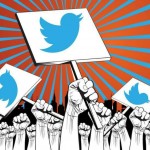 It’s a common accusation labelled against social media that it has resulted in a tremendous polarization of society and debate on issues such as politics and climate change. The hypothesis is that platforms like Twitter make it easier than ever before to only follow those who largely subscribe to our point of view, which creates the impression that more moderate voices are drowned out.
It’s a common accusation labelled against social media that it has resulted in a tremendous polarization of society and debate on issues such as politics and climate change. The hypothesis is that platforms like Twitter make it easier than ever before to only follow those who largely subscribe to our point of view, which creates the impression that more moderate voices are drowned out.
A new study from the Missouri School of Journalism suggests that the highly partisan nature of Twitter can result in less engaged or more moderate voices avoiding politics entirely.
“We are not necessarily getting farther and farther apart – it’s just the people in the middle are becoming more quiet and withdrawn,” the authors say. “If you fail to consider all the people in the middle who do not care about politics as much, it seems like there is a more clear division when there is not, so social media might be artificially creating this sense that we are becoming more polarized.”
Diverse points of view
It’s a frequent accusation against social media that rather than exposing us to diverse points of view, it instead creates filter bubbles that merely reinforce our existing points of view. The study is one of the first to examine the change in behaviors in real-time as a result of this polarization.
The researchers examined the user networks of around 3,000 randomly selected followers of famous partisan Twitter accounts over a six month period prior to the 2016 Presidential election.
As the election drew nearer, there was a clear trend towards more polarization, with Democrats following more and more Democrats, and Republicans doing likewise with fellow Republicans. For the moderates, they didn’t appear to increase their following of either Republicans or Democrats.
“Whenever using Twitter or any type of social media, it is important to double check and validate the information you are receiving,” the authors conclude. “Twitter allows us to connect with a lot of people and gain access to information, but users should not assume that the information is representative or an accurate reflection of the public.”